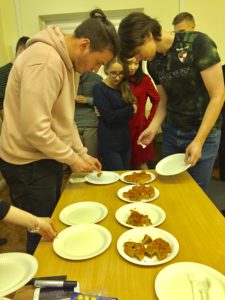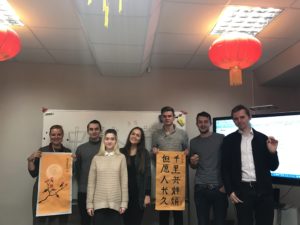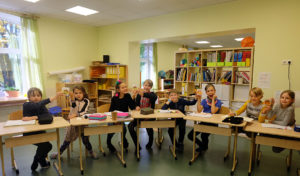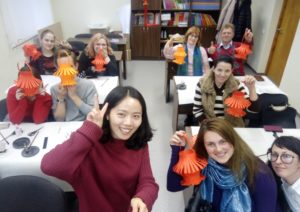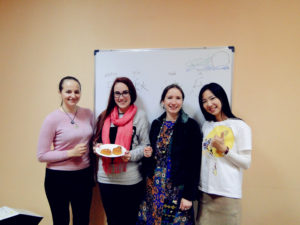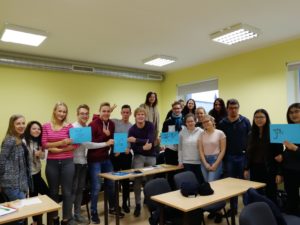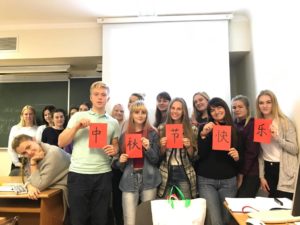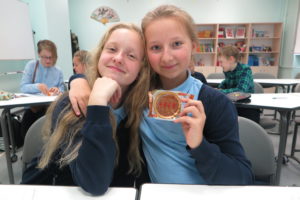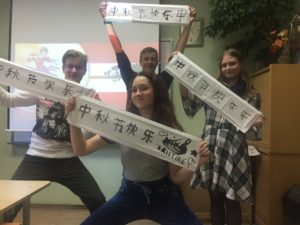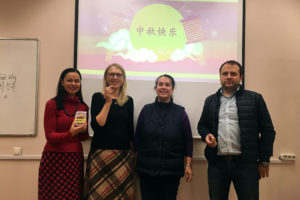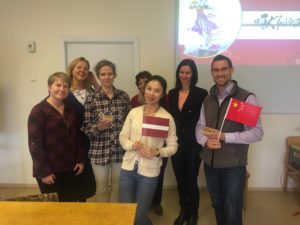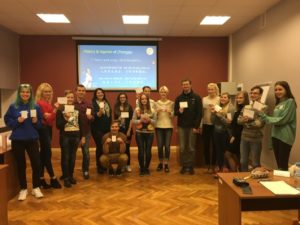Appreciating the Moon on the Mid-Autumn Festival, Sending Homesickness by Moon Cake – -the Mid-Autumn Festival Cultural Experiences at the Chinese Programmes at Confucius Institute at the University of Latvia
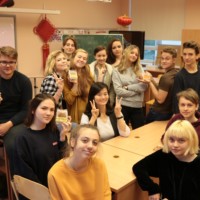
秋意渐浓,晚风微凉,对月当歌,人生几何–这就是中秋前后,拉脱维亚大学孔子学院各教学点的写照。当地时间10月2日-9日期间,拉脱维亚大学孔子学院本部及下设各教学点纷纷开展了形式各样的中秋节文化体验活动,与学生们共同庆祝中秋佳节,感受这一传统节日传递的浓浓情意。
中秋节自古便有祭月、赏月、拜月、吃月饼、饮桂花酒等习俗,流传至今,经久不息。虽说出门在外,条件有限,但是月饼是必不可少的主角儿。各个教学点以月饼为引,牵出了丰富多彩的中秋文化体验活动:
拉脱维亚大学孔子学院本部的志愿者教师们不仅为学生们讲解了中秋节的习俗、带学生学写汉字、学唱歌曲《水调歌头》,还一起了解了宋词的特点、唐诗与宋词的异同及北宋著名词人苏轼。
里加文化中学孔子课堂上,老师向孩子们详细介绍了中秋节的日期、中国的农历、“中秋节”节日名字的含义、节日的来历,以及节日习俗,让孩子们体味到了中国人重亲情、爱团圆的文化观念。此外,老师还根据不同年级汉语教学的不同侧重点,为孩子们准备不同的课堂活动,十年级侧重语音教学,老师教孩子们唱《我们的月亮一定圆》这首中秋歌曲;十一年级侧重汉字教学,老师教孩子们写“中、秋、月、团、圆”这些字;十二年级侧重文化教学,老师准备了一个“猜灯谜”的活动。各个年级在“学中玩,玩中学”,学得不亦乐乎。
道加瓦皮尔斯大学孔子课堂的中秋体验活动上,志愿者教师带领学生观看了9月30日拉脱维亚大学中秋晚会的视频,介绍了中秋节的由来和传统习俗,并和学生交流了中拉两国的相关文化活动。
雷泽克内大学孔子课堂开设了中秋文化讲座,除了中秋知识讲解,还设了四个活动项目:中国书法、制作中秋灯笼、中秋音乐欣赏和品月饼。
里加34中学汉语教师志愿者吴炜在用俄语介绍完中秋节后,教学生大声朗读“中秋节快乐”。之后,大家一边听着音乐,一边品尝月饼并合影留念。活动的最后,吴炜和大家讲了讲关于中秋节的故事,里加34中的学生们也分享了拉脱维亚传统节日的由来。
交通与电信大学的汉语教师志愿者刘梦珂与学生们一同尝月饼,通过书法、歌曲品中国文化,赏明月,共度中秋佳节。
叶尔加瓦斯比杜拉中学教学点以及拉脱维亚农业大学教学点的汉语教师志愿者张扬,不仅为学生们介绍了中秋节的传统习俗,还讲解了现代中国人的新式中秋-多种新颖的月饼馅儿以及烧烤赏月等等,同时还介绍了周边文化圈内其他也有中秋节的国家及习俗。随后带领学生体验书法,学生们第一次使用“文房四宝”写下了对遥远东方的祝福。
拉脱维亚文化学院教学点举行了“吟中秋,吃月饼”的活动。首先,汉语教师志愿者朱玥身着自己设计的“中秋节”文化衫和学生们介绍了文化衫上汉字及图画的含义。接着播放了介绍中秋节的视频,讲解了中秋节的由来、习俗并带领学生一起品读唐代大诗人李白的《静夜思》。
蒙特梭利探索学校教学点的小朋友们一起齐动手,制作了中秋节兔子灯笼。
文茨皮尔斯大学教学点举行“吃月饼,迎中秋”的活动。汉语教师志愿者播放介绍了中秋节的沙画视频,接着讲解了中秋节的来源、习俗、传说和不同亚洲国家怎样庆祝中秋节。
维泽梅大学教学点汉语教师志愿者于洋通过课件、视频与音乐向学生们介绍了中秋节的历史与习俗。
而一曲《但愿人长久》拉开了拉脱维亚大学汉语初级班与里加理工大学教学点中秋联谊会的序幕。席间,拉脱维亚大学汉语教师志愿者林婕向学生们讲述了中秋传统习俗,展示了各种风味的中秋月饼,共话中秋佳节团圆情。里加理工大学汉语教师志愿者胡越带领学生们吟诵千古名篇《水调歌头》,共叙佳话。
对月中秋日,以“饼”品相思。因为有了这些热爱汉语的学生们的陪伴,我们的心是暖的。借着中秋那一轮明月,我们交流着彼此的文化,增进着双方的友谊,祈愿着美好的明天。
Fall is getting stronger, night breeze is cold, sing while appreciating full moon, how long is a man’s life?–this is the portrayal of Mid-Autumn Festival of teaching spots at CILU. Local time from October 2nd to 9th, the students who came from teaching spots at CILU celebrated the coming of Chinese traditional festival “Mid-Autumn Festival” with Chinese teachers by various activities, and to feel the deep friendship among the festival.
Since ancient times, there were some customs like watching full moon, worship the moon, eat moon cakes, drink osmanthus wine on the day of Mid-Autumn Festival, passed from generation to generation.Although conditions are limited, moon cakes are essential characters. Each teaching point brought variety cultural activities which surrounded by moon cakes:
At CILU, Chinese volunteer teachers explained the origin, legend stories, customs of the Mid-autumn Festival, taste moon cake, read poetry, write Chinese character and sing songs.Afterwards the Chinese teacher helped the students to understand the characteristics of the Song Ci, the similarities and differences between the Song Ci and Tang Poetry and the famous poet Su Shi from Northern Song Dynasty.
At the Confucius Classroom at Riga Culture Secondary school, teacher introduced Mid-Autumn festival in detail with pictures and videos to students. In addition, teacher also prepared different classroom activities for students according to different teaching emphases of different grades. Grade ten focuses on pronunciation teaching, so teacher taught them a Chinese song about Mid-Autumn festival. Grade eleven focuses on Chinese character teaching, so teacher taught them characters relevant to Mid-Autumn festival. Grade twelve focuses on Chinese culture teaching, so teacher prepared a lantern riddle-guessing game for them. Each grade had fun while learning.
At 4th October, students and volunteer teachers of Confucius classroom at Daugavpils University celebrated the Chinese traditional Mid-Autumn festival by playing a video of Confucius Institute Mid-Autumn Day concert, showing a feast of Chinese traditional instrument and culture. They have also exchanged the both countries’ culture activities and relevant legends.
Confucius Classroom at Rezekne Academy of Technologies celebrated the Mid-Autumn Festival by holding lecture. It contained the introduction of Mid-Autumn Festival,and three activities: Chinese Calligraphy,hand-making Mid-Autumn Festival lanterns, music appreciation and mooncake tasting.
Riga No.34 Secondary School Confucius Classroom held a Mid-Autumn Festival celebration.Celebrating from the introduction of the Mid-Autumn Festival, the Chinese volunteer teacher Wu Wei wrote on the blackboard “Happy Mid-Autumn Festival” five characters, she taught students to read aloud “Happy Mid-Autumn Festival” in Chinese. After that, everyone listening to the music while eating the moon cakes and taken pictures.At the end of the event, everyone chatting together, Wu Wei and everyone talked about the story of the Mid-Autumn Festival, Riga No.34 Secondary School students also shared the origin of the traditional festivals in Latvia.
At the Transport and Telecommunication institute, Chinese teacher volunteer Liu Mengke and his students taste the moon cake, appreciate the festival culture, enjoy the moon, spend the Mid-Autumn Festival together.
At Jelgava Spidola Gymnasium and Latvia University of Agriculture. Experiencing from the introduction of character “中秋节”. Then playing the video of the origin of Mid-Autumn Festival . Not only introduced the traditional custom, but also the innovative modern celebrate way of Mid-Autumn Festival, such as doing BBQ while admiring the full moon, and a variety of moon cake stuffing and so on. It also introduced the peripheral cultural circle in other countries’ custom of Mid Autumn Festival. Then the Chinese volunteer teacher led the students to experience the calligraphy. This was the first time that students used “the scholar’s four jewels” to express their best wishes to that oriental country.
Latvian Academy of Culture’s celebration started in the Modern Chinese Lecture. Then, Volunteer Chinese teacher Zhu Yue dressing in a special T-shirt designed by herself introduced to the students the meaning of these Chinese characters and painting on the T-shirt about the Mid-Autumn Festival. Then she played a video about the introduction of the Mid-Autumn Festival, explained the origin, customs and legend of the Goddess Chang’s fly to the moon and read ‘Thoughts in the Silent Night’ written by the famous poet in Tang Dynasty Li Bai.
Taste a mooncake personally, reunion together to make a rabbit lantern, listen to the story of the Mid-Autumn Festival introduced by the Chinese teacher, say “Happy Mid-Autumn Festival “. At Latvian’s Montessori Elementary School, the children from Chinese Junior Class also enjoyed the strong atmosphere of China’s Mid-Autumn Festival.
Ventspils University College which is the first institution in Western Latvia that offers Chinese program celebrated the Mid-Autumn Festival.First of all, the Chinese volunteer teacher played a Sand painting video about the introduction of the Mid-Autumn Festival, and then explained the origin, customs and legend of the Mid-Autumn Festival and how different Asian countries celebrated the Mid-Autumn Festival. The last part is listening to the music which mean may we all be blessed with longevity and eating the mooncakes .
At the evening of October 4th, the students who came from Chinese beginners’ class of LUCI and RTU got together to celebrate the coming of Chinese traditional festival “Mid-Autumn Festival”.The association began with the song of “Shui Diao Ge Tou” . During the activity, Lin Jie, the Chinese volunteer teacher of LUCI, introduced the traditional customs of Mid – Autumn Festival and several flavors of moon cakes , . Hu Yue, the Chinese volunteer teacher of RTU, led the students to recite the famous poetry “Shui Diao Ge Tou”
Vidzemes University of Applied Sciences in Latvia held the celebration of Mid-Autumn Festival. On the Chinese class,the Chinese teacher YangYu introduced the history and traditions of Mid-Autumn Festival by various ways.
Appreciating the moon on the Mid-Autumn festival, sending homesickness by moon cake. Our heart is getting warmer and warmer, because of the company of students who love Chinese.By the Mid-Autumn Festival moon, we communicate with each other’s culture, promote the friendship between the two sides, and pray for a better tomorrow.


